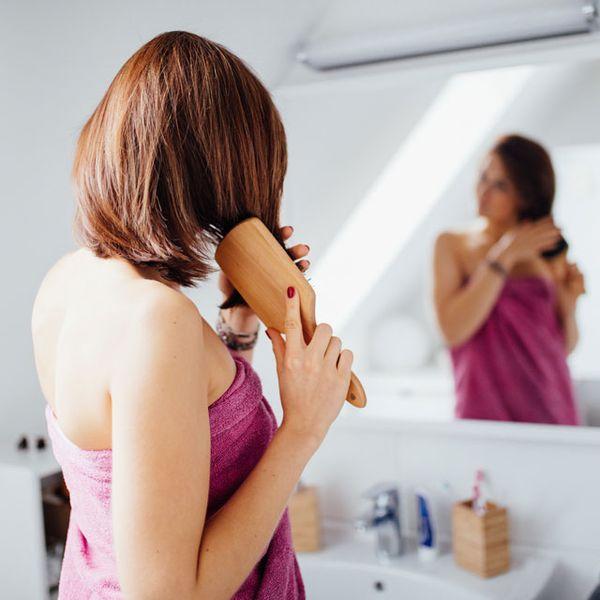Biotin Benefits for Every Body
Looking for the ultimate beauty vitamin for your hair, skin and nails? If so, you may want to try biotin. It’s often added to hair and skin products or taken as a beauty supplement to nurture thicker hair, stronger nails and healthy skin. And while all that may sound like plenty for one vitamin to do, the potential benefits of biotin don’t stop there.
Also known as vitamin B-7, or vitamin H (from the German words Haar and Haut, which translate to “hair and skin”), this nutrient may be famous for its external benefits, but more benefits of biotin come from the work it does on the inside. So, what exactly is biotin and what does biotin do?
What is Biotin and What Does Biotin Do?
Biotin is a water-soluble vitamin and a member of the B-complex family of vitamins. It’s an essential nutrient involved in energy metabolism. More specifically, biotin is a cofactor to five different enzymes that metabolize fat, protein and carbohydrates.1 Biotin works with your body to produce energy by helping to break down the proteins and fatty acids in your diet. It also plays roles in cellular signaling and gene regulation.1 While its part in these vital functions is a great reason to make sure you get enough biotin every day, these are not the primary reasons most people choose to take biotin as a supplement.
What is Biotin Used For?
Biotin is best known for providing nutritional support for hair, skin and nails. It’s used to make hair less brittle, nails thicker and skin healthier. How does it do that? Researchers believe it may do so by improving your body’s keratin structures.2 Keratin forms the framework of epithelial cells, which line the surfaces and cavities of the body.3 It’s also the basic protein that makes up your hair, skin and nails and it’s responsible for giving them strength and resilience.3
So, if your nails are brittle or your hair is easily damaged, giving your body what it needs to improve keratin structures may do the trick. When your body’s keratin structures are supported, it makes sense that keratin-dependent features would benefit.
While biotin is most often taken to support the health of hair, skin and nails, it may also support energy and cognitive health, as well as healthy nerves and muscles.4
Biotin for Hair
Research results suggest that biotin may help significantly boost the thickness and growth of hair.5,6 In multiple, placebo-controlled studies, participants complaining of thinning hair that were given oral biotin supplements experienced noticeable and significant increases in hair growth or thickness after 90 and 180 days.5,6
Biotin for Skin
Biotin’s role in skin health isn’t fully understood, but researchers have confirmed that if you have low levels of biotin it may affect the health of your skin.7,8 And they suspect that in addition to its role in keratin production, biotin may help promote skin health due to its part in fat metabolism.7,9 Your skin cells need access to fatty acids to stay supple and produce the natural oil barrier that helps keep skin hydrated and healthy-looking.10
Biotin for Nails
Several scientific studies have shown positive results from using biotin to strengthen nails.11,12 One study showed that biotin may increase nail thickness by as much as 25% in individuals that have weak nails.11 In that study, 63% of participants taking biotin showed an improvement in nail strength after 6 months.11 Other studies have shown similar results from taking biotin for nails, even for participants with healthy levels of biotin at the beginning of the studies.12
Biotin for Energy
Biotin plays important roles in energy production and macronutrient metabolism.7 Several metabolic enzymes need biotin to function properly and convert the foods we eat into energy our bodies can use, and to initiate processing of macronutrients.7 Biotin plays a role in the production of glucose from noncarbohydrate sources, fatty acid synthesis, and the breakdown of amino acids, all of which are related to energy production.7
Biotin for Cognitive Health
One of the same energy-supporting processes that require biotin also helps fuel the brain. Glucose is one of your brain’s basic needs for cognitive performance.14 And biotin is required for an essential enzyme in the gluconeogenic pathway.14 Your brain also needs many other B-complex vitamins for glucose oxidation, so if cognitive performance is your goal, be sure to meet your daily requirements of the full range of B vitamins, including biotin.14
Biotin and Weight Loss
Can the same supplement that helps keep your hair, skin and nails healthy also help you lose weight? Although biotin does play key roles in metabolizing proteins, fats and carbohydrates, the idea of using biotin for weight loss may be too good to be true. There is no evidence that biotin will help you lose weight, however people who have lost a lot of weight quickly sometimes have low levels of biotin after weight loss.4
Biotin for Men
Biotin is used by many men to help promote hair growth and thickness, including taking biotin for beard and mustache growth. It may also help men keep their nails strong and skin healthy. Biotin isn’t just for women—It’s healthy for everyone!
How Much Biotin to Take
Although the Food and Nutrition Board (FNB) has not established a Recommended Dietary Allowance (RDA) for biotin, they have established guidelines for Adequate Intakes (AIs) for all age groups. For most adults over 19 years of age, the adequate intake recommendation is 30 mcg of biotin per day. The full list is below.
- Birth to 6 months (5 mcg)
- 7–12 months (6 mcg)
- 1–3 years (8 mcg)
- 4–8 years (12 mcg)
- 9–13 (25 mcg)
- 14–18 years (25 mcg)
- 19+ years (30 mcg)
- Pregnant females 14+ (30 mcg)
- Nursing females 14+ (35 mcg)
Certain individuals may need more biotin. People who often drink alcohol may have lower levels, and at least a third of pregnant women have low biotin levels.1 Also, certain medications may interfere with biotin levels.13 So, be sure to talk with your doctor to determine the biotin dosage that is right for you.
Can You Take Too Much Biotin?
Biotin appears to be safe and easily tolerated by most people, even at higher levels. Under the care of a physician, pharmacological doses have ranged up to 20 mg per day.1 But don’t take extreme amounts of biotin unless directed to do so by a doctor. Also, biotin is considered likely safe when applied to the skin in cosmetic formulations that contain 0.0001% to 0.6% biotin.4
Always stick to the dosage recommendations listed on the product and check with your doctor before starting any new supplement. Biotin may lessen the effects of some medications, and some drugs may also lower your levels of biotin.13
Biotin Supplements
Biotin supplements are a convenient way to get your daily intake of this essential B vitamin, and when it comes to biotin supplements, you have a plethora of options—from biotin supplements derived from real food sources to high potency biotin and sublingual biotin. Here are some of our favorite biotin supplements available from Swanson Health.
Swanson Ultra Real Food Biotin
From our new line of real food supplements, Real Food Biotin delivers what your body needs and nothing more. This supplement provides 5,000 mcg (5 grams) of biotin in every two-capsule serving.
Swanson Premium Biotin
Get your daily fill of this beauty nutrient with Swanson Premium Biotin, which delivers 5,000 mcg (5 grams) of D-biotin, the naturally occurring, biologically active form of biotin. The pill size for this supplement is smaller than some other brands, which may make it easier to take.
Swanson Premium High Potency Biotin
For a high-potency, double-duty nutritional boost that can help optimize your mental and physical energy while enhancing your beauty regimen, make Swanson Premium Super Strength Biotin softgels a part of your daily routine. Each softgel contains 10,000 mcg (10 grams) of biotin.
Swanson Ultra Time-Release Biotin
Our new timed release biotin tablets deliver twice the potency of our standard biotin capsules in a specific formulation that releases slowly throughout the day for consistent 'round-the-clock nourishment. Each capsule provides 10,000 mcg (10 grams) of biotin that is delivered slowly throughout the day.
Sublingual Biotin
Jump-start your energy level with a sublingual biotin supplement that dissolves quickly in your mouth. Our new Supplemelts™ Sublingual Biotin offers fast-acting energy in a sugar-free formula. This sublingual supplement is sweetened with xylitol and delivers 5,000 mcg (5 grams) of biotin.
Food Sources of Biotin
While biotin supplements may offer convenience, there are plenty of food sources of biotin as well. Biotin-rich foods include organ meats, eggs, fish, seeds, nuts and some vegetables.1 Here’s a list of some food sources of biotin.
- Beef liver (30.8 mcg per 3 ounces)
- Egg (10 mcg per egg)
- Salmon (5 mcg per 3 ounces)
- Pork chop (3.8 mcg per 3 ounces)
- Sunflower seeds (2.6 mcg per ¼ cup)
- Almonds (1.5 mcg per ¼ cup)
- Tuna (0.6 mcg per 3 ounces)
- Spinach (0.5 mcg per ½ cup)
- Broccoli (0.4 mcg per ½ cup)
Benefits of Biotin
What you put into your body shows on the outside, and biotin supplements are an excellent choice for your nutritional routine given the many potential benefits of biotin, including helping you get thicker hair, stronger nails, healthier skin and more physical and mental energy.
Read more about ways to give your health and beauty routine a natural boost in Brilliant Beauty Basics: Our Top Five Ingredients for Brilliant Hair, Skin & Nails, and learn about the detoxifying benefits of activated charcoal in What is Activated Charcoal?

About Lindsey Toth, MS, RD
Registered Dietitian, Swanson Health Products
Lindsey is a nationally-recognized registered dietitian and nutritionist with a soft spot for pie. She empowers people to take charge of their health by finding the balance between the pleasure and nourishment in food.
Her philosophy is that you should take care of your body because it’s the only permanent home you have. It’s what inspired her to pursue a career in nutrition and, ultimately, led her to Swanson Health Products.
Sources
1 Biotin Fact Sheet for Health Professionals. National Institutes of Health Office of Dietary Supplements. https://ods.od.nih.gov/factsheets/Biotin-HealthProfessional/ (Accessed 04/03/2018)
2 Biotin. Science Direct. https://www.sciencedirect.com/topics/neuroscience/biotin (Accessed 04/03/2018)
3 Keratins. Genetic Home Reference. https://ghr.nlm.nih.gov/primer/genefamily/keratins (Accessed 04/03/2018)
4 Biotin. WebMD. https://www.webmd.com/vitamins-supplements/ingredientmono-313-biotin.aspx?activeingredientid=313&activeingredientname=biotin (Accessed 04/03/2018)
5 A 3-Month, Randomized, Double-Blind, Placebo-Controlled Study Evaluating the Ability of an Extra-Strength Marine Protein Supplement to Promote Hair Growth and Decrease Shedding in Women with Self-Perceived Thinning Hair. Dermatology Research and Practice Volume 2015 https://www.hindawi.com/journals/drp/2015/841570/ (Accessed 04/03/2018)
6 A Double-blind, Placebo-controlled Study Evaluating the Efficacy of an Oral Supplement in Women with Self-Perceived Thinning Hair. The Journal of Clinical and Aesthetic Dermatology. https://www.ncbi.nlm.nih.gov/pmc/articles/PMC3509882/ (Accessed 04/03/2018)
7 What are the health benefits of biotin? Medical News Today. https://www.medicalnewstoday.com/articles/318724.php (Accessed 04/03/2018)
8 Skin manifestations of biotin deficiency. PubMed. https://www.ncbi.nlm.nih.gov/pubmed/1764357 (Accessed 04/04/2018)
9 Skin manifestations of biotin deficiency. PubMed. https://www.ncbi.nlm.nih.gov/pubmed/1764357 (Accessed 04/04/2018)
10 Natural Skin Care: The Skinny on Fats. WebMD. https://www.webmd.com/beauty/features/natural-skin-care-skinny-fats (Accessed 04/04/2018)
11 Brittle nails: response to daily biotin supplementation. PubMed. https://www.ncbi.nlm.nih.gov/pubmed/8477615 (Accessed 04/04/2018)
12 Biotin. U.S. National Library of Medicine. https://toxnet.nlm.nih.gov/cgi-bin/sis/search2/r?dbs+hsdb:@term+@rn+58-85-5 (Accessed 04/04/2018)
13 Biotin. WebMD. https://www.webmd.com/vitamins-and-supplements/supplement-guide-biotin#1 (Accessed 04/04/2018)
14 Cognitive Function In-Depth. Oregon State University. http://lpi.oregonstate.edu/mic/health-disease/cognitive-function (Accessed 04/04/2018)
*These statements have not been evaluated by the Food and Drug Administration. These products are not intended to diagnose, treat, cure or prevent any disease.




